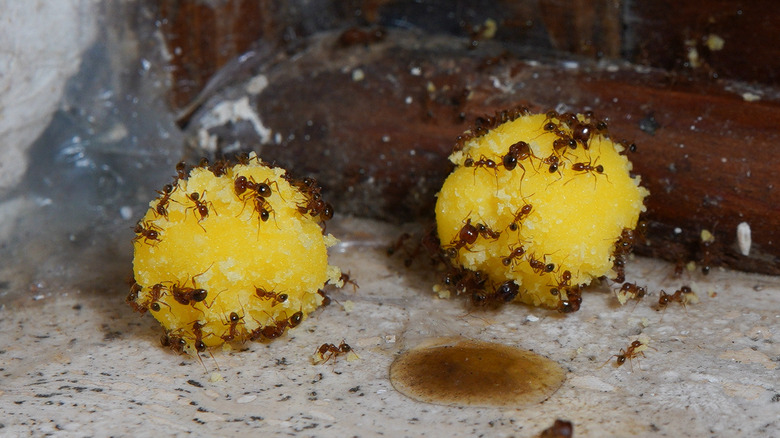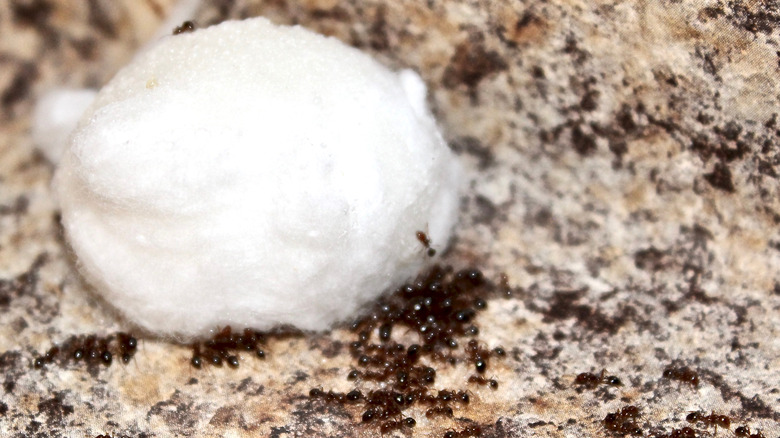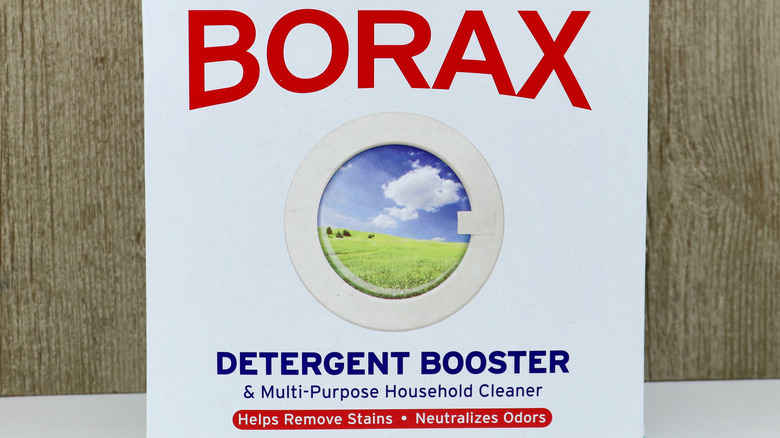Is Borax Or Boric Acid Better For Pest Control?
Although it works primarily as a detergent booster for cleaning stains in the laundry, there are many options for using borax at home, including with pest control. Another option for getting rid of termites and other pests is boric acid.
However, it's important to note that these two compounds are not the same. "They are two entirely different chemical compounds," Wyatt West, a board-certified entomologist with Ehrlich Pest Control, told Family Handyman. Both borax and boric acid come from the same compound with a primary ingredient of boron, which is atomic number 5 and represented by the symbol B. However, borax is a compound considered to be closer to the original boron with less processing to result in the final product. Boric acid, meanwhile, requires a greater level of refinement to create a usable product.
This refinement helps boric acid become a better option for pest control, as it ends up being more lethal for insects in the final form. Borax also would kill insects, but they are less likely to absorb or ingest it in high enough quantities to result in death. "Borax is generally less effective than boric acid as an insecticide," explained West. "If you are going to purchase either of them, boric acid would be the way to go." Boric acid appears in many pesticides and in powder, liquid, and tablet forms. It's able to kill bugs when they ingest or absorb it.
How does boric acid work in pest control products?
Boric acid is an effective pesticide that you can use in a trap or in a loose powder form to draw insects and kill them. When used in a powder form, it has a much finer consistency than borax, which makes it more lethal to bugs. As insects walk through the powder, it will stick to them, creating abrasions on the exoskeleton of the bug. This situation would not kill them immediately, but it would be effective over the course of a few days, causing abrasions that lead to death.
As an added level of effectiveness for boric acid, the fine powder remains stuck to the bodies of the pests as they move around. Eventually, they likely will transport the boric acid back to the nest, exposing other insects to the poison. They also could ingest the powder, usually accidentally after it sticks to their bodies. It functions as an internal poison when the bugs ingest it, leaving the bug's metabolism not functioning properly, eventually leading to death. Should other insects at the nest feed on the dead ones, they may ingest the powder, eventually killing them, too.
To use boric acid as a poisonous bait, you can mix it with other substances that insects like to eat, enhancing the chances that they will ingest it. You may try placing peanut butter in a small bowl where you see the insects. Then sprinkle the boric acid over the peanut butter.
Could you use borax to try to kill unwanted insects?
Although borax will work as a pesticide, especially on ants and cockroaches, it works better as a laundry additive or in hand soap than as a pesticide. It is a combination of boron, oxygen, hydrogen, and sodium, which differs from boric acid, which is a combination of boron, hydrogen, and oxygen.
Borax can have effects similar to boric acid when insects come in contact with it or when they ingest it. However, because the borax powder's grains are not as fine as what's found with boric acid, the powder doesn't stick to the insects' bodies as effectively, reducing the chances that they would ingest it, that they would carry it to the nest, or that it would affect their exoskeletons. The refinement process that boric acid goes through versus borax creates the much finer powder found with boric acid. Because of this, most pest control teams don't recommend using borax for insect control, relying on the more effective boric acid instead.
If you want to use borax as a pest control option, the better idea is to mix it with other items and foods that insects are likely to ingest. In a situation like this, its coarser grains blend into a powdered food more naturally, making it more likely for the insect to ingest it. You could mix it with granular sugar, powdered sugar, or cocoa powder for an effective poison that cockroaches especially have a difficult time resisting.


